(考点特训)2025年中考英语一轮复习4:Grade 7 Book 2 Modules 1~4课件(外研版七年级下册)
文档属性
| 名称 | (考点特训)2025年中考英语一轮复习4:Grade 7 Book 2 Modules 1~4课件(外研版七年级下册) |

|
|
| 格式 | pptx | ||
| 文件大小 | 705.5KB | ||
| 资源类型 | 试卷 | ||
| 版本资源 | 外研版 | ||
| 科目 | 英语 | ||
| 更新时间 | 2025-05-12 23:04:07 | ||
图片预览


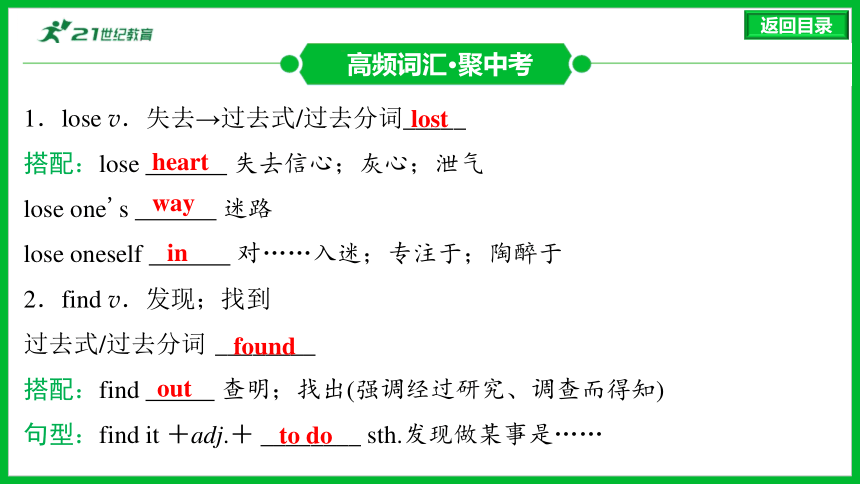


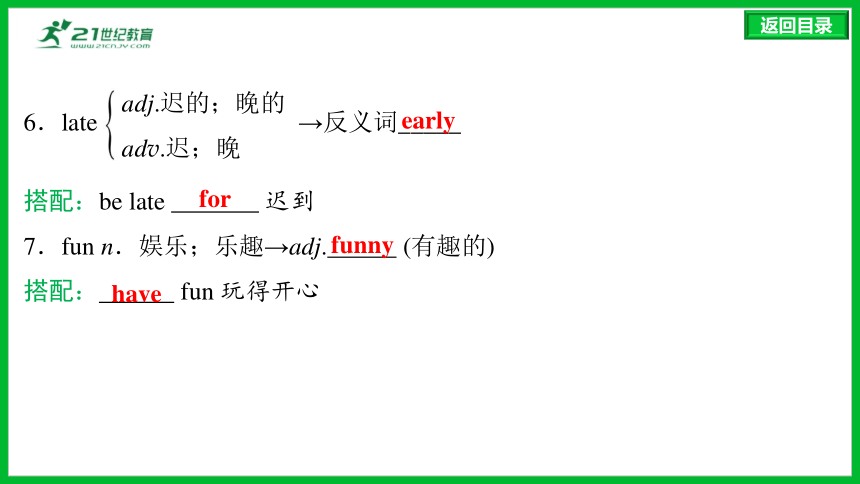

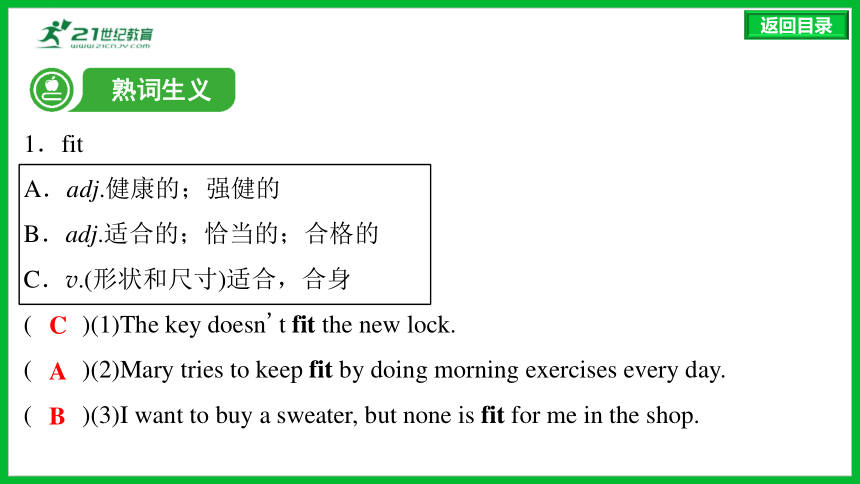
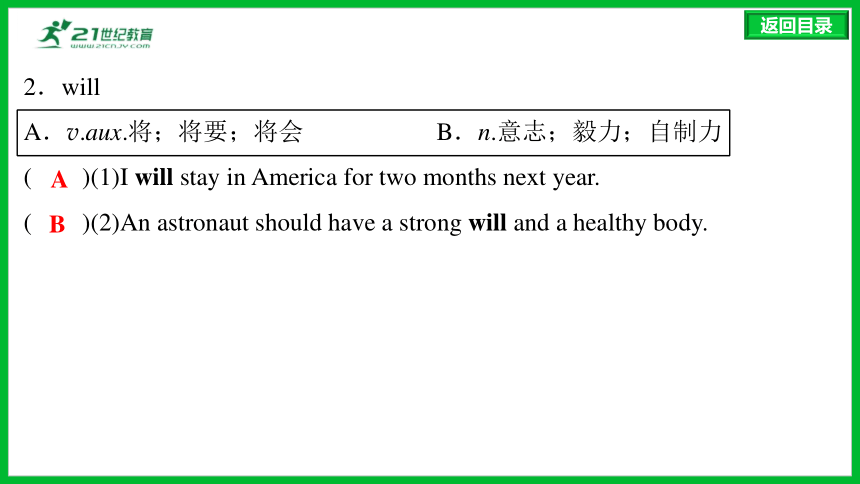
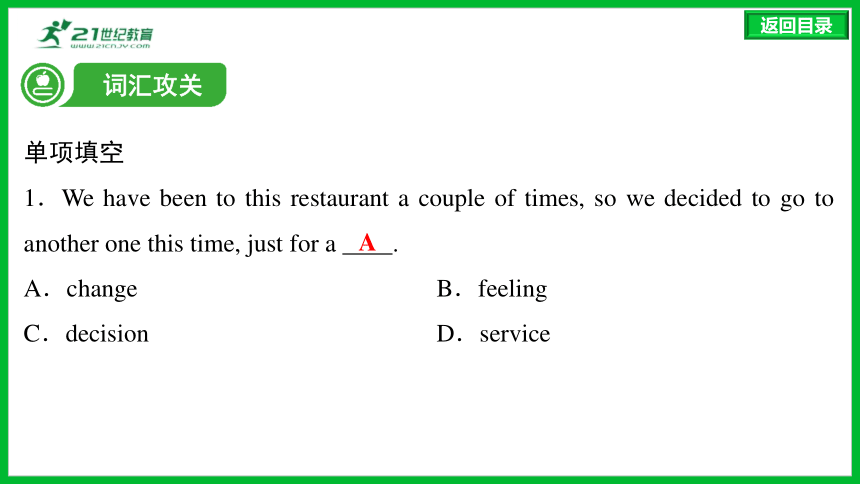
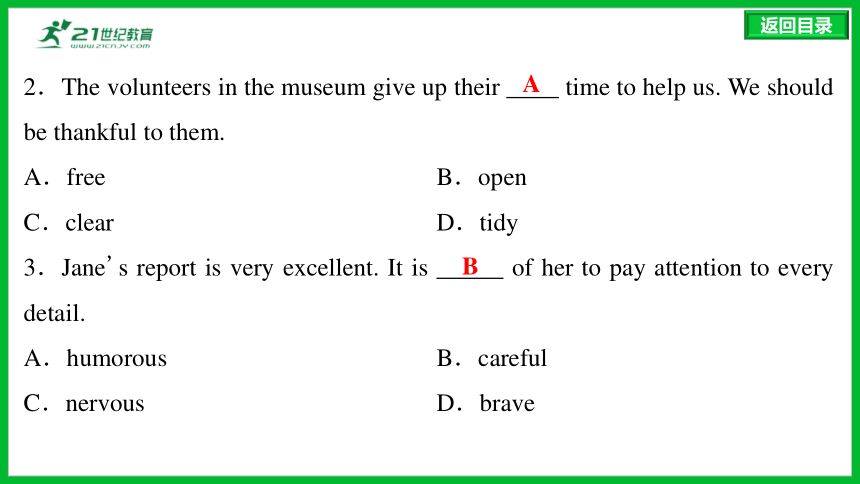
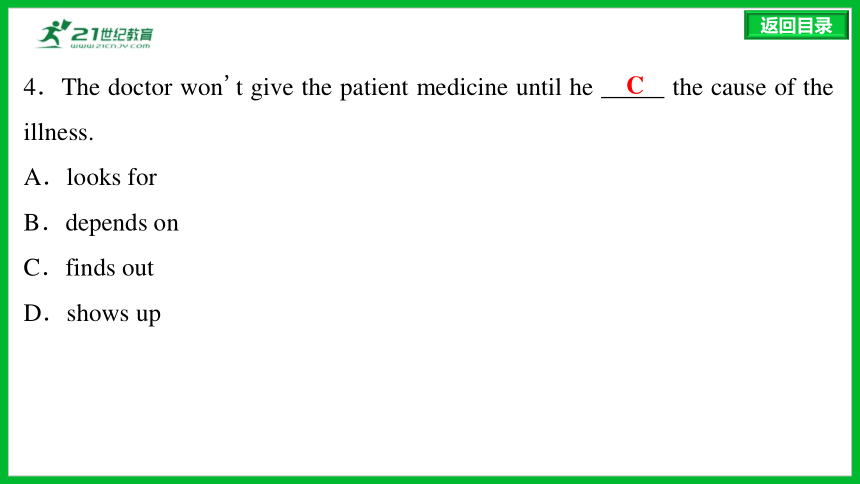
文档简介
(共51张PPT)
中考一轮复习 教材知识整合
Grade 7 Book 2
Modules 1~4
高频词汇·聚中考
重难考点·提能力
语法整合·增效能
核心实验·提素养
文化热点·通古今
高频词汇·聚中考
1.lose v.失去→过去式/过去分词_____
搭配:lose 失去信心;灰心;泄气
lose one's 迷路
lose oneself 对……入迷;专注于;陶醉于
2.find v.发现;找到
过去式/过去分词 ________
搭配:find 查明;找出(强调经过研究、调查而得知)
句型:find it +adj.+ ________ sth.发现做某事是……
heart
way
in
found
out
to do
lost
3.careful adj.小心的;仔细的;认真的→
adv. (认真地)
搭配:be careful 对……认真
4.worry v.焦虑;担心→
过去式/过去分词__________
adj. (担心的)
搭配:worry 担心
carefully
about/with/of
worried
worried
about
5.teach v.教;讲授→
过去式/过去分词 ________
n. (老师)
搭配:teach sb. _______ sth.教某人做某事
teach ________ 自学
teach sb. sth./teach sth. ___ sb.教某人某事
taught
teacher
to do
oneself
to
6.late →反义词_____
搭配:be late 迟到
7.fun n.娱乐;乐趣→adj. (有趣的)
搭配: fun 玩得开心
for
funny
have
adj.迟的;晚的
adv.迟;晚
early
8.change v.& n.改变;变化
搭配: changes 做出改变
change one's 改变某人的想法
9.free adj.(时间)空闲的;空余的;免费的;自由的;不受束缚的→
adv . (自由地)
n. (自由)
搭配: one's free time 在某人的空闲时间
make
mind
freely
freedom
in
1.fit
A.adj.健康的;强健的
B.adj.适合的;恰当的;合格的
C.v.(形状和尺寸)适合,合身
( )(1)The key doesn't fit the new lock.
( )(2)Mary tries to keep fit by doing morning exercises every day.
( )(3)I want to buy a sweater, but none is fit for me in the shop.
熟词生义
C
A
B
2.will
A.v.aux.将;将要;将会 B.n.意志;毅力;自制力
( )(1)I will stay in America for two months next year.
( )(2)An astronaut should have a strong will and a healthy body.
A
B
词汇攻关
单项填空
1.We have been to this restaurant a couple of times, so we decided to go to another one this time, just for a .
A.change B.feeling
C.decision D.service
A
2.The volunteers in the museum give up their time to help us. We should be thankful to them.
A.free B.open
C.clear D.tidy
3.Jane's report is very excellent. It is of her to pay attention to every detail.
A.humorous B.careful
C.nervous D.brave
A
B
4.The doctor won't give the patient medicine until he the cause of the illness.
A.looks for
B.depends on
C.finds out
D.shows up
C
单词拼写
5.In today's DIY class, our teacher t (教) us to make kites in different shapes.
6.This morning my clock broke down, so I overslept and I was l (迟到的) for the meeting.
7.You may make mistakes in your life, but the key is to learn from them and never l (失去) heart.
aught
ate
ose
重难考点·提能力
考点1
would like的用法
【教材例句】 I'd like to join the Music Club because I can play the piano.我想加入音乐俱乐部,因为我会弹钢琴。 【七(下)Module 2 P8】
e.g. I would like some coffee.=I want some coffee.我想要一些咖啡。
I would like to be a volunteer.=I want to be a volunteer.我想成为一名志愿者。
I would like you to talk about the accident.=I want you to talk about the accident.我想让你谈一谈这个事故。
拓展
(1)Would you like to do sth.?是用来礼貌地询问对方意愿的常用句型,其肯定回答为“Yes, I'd love/like to.”;其否定回答为“No, thanks.”“I'd love/like to, but…”。
(2)Would you like sth.?的肯定回答是“Yes, please.”;否定回答是“No, thanks.”。
考点2
promise 的用法
【教材例句】 Choose me as your class monitor and I promise to help YOU!选我当你们的班长,我保证会帮助你们! 【七(下)Module 2 P10】
考 点 词性及含义 常用搭配
promise 可数名词,意为“诺言;承诺” make promises/a promise 许诺
keep promises/a promise 信守诺言
break promises/a promise 违背诺言
考 点 词性及含义 常用搭配
promise 作及物动词时,意为“许诺;保证;答应” promise sb./sth. 意为 “许诺某人/某事”
promise to do sth. 意为 “承诺去做某事”
promise sb. sth. 意为 “许诺某人某事”
“promise+that从句”意为 “答应/保证……”
e.g. I promise that I will study harder to catch up with others this term.我保证这学期我会更加努力学习以赶上别人。
Mr. Li made a promise to move to a bigger flat as soon as he changed the job.李先生承诺他一换工作就搬到更大的公寓。
考点3
辨析win与beat
【教材例句】 I hope they win the match!我希望他们赢得比赛!
【七(下)Module 3 P16】
考 点 含 义 用 法
win 获胜;赢得 win+比赛/奖品/荣誉/战争,其名词形式winner意为“获胜者”
beat 打败 beat+对手(人名或队名)
击打,指连续击打 beat+宾语
beat against+宾语
e.g. The members of the team are practising really hard in order to win the coming game.为了赢得即将到来的比赛,队员们都在努力训练。
The rain beat against the windows last night.昨晚雨敲打着窗户。
Our team beat theirs in the finals.我们队在决赛中打败了他们队。
活学巧练
1.-Can Jimmy help us with the problem
-Yes, his is as good as gold. Trust him!
A.mistake B.record
C.promise D.excuse
C
2.It is easy for us to a promise but hard to keep it.
A.make B.break
C.report D.compare
3.-Who do you think will the reading competition
-Sarah, without doubt. She reads best in our class.
A.lose B.win
C.beat D.return
A
B
4.-Would you like to go for a picnic
- . But I'm busy preparing a report for my science class.
A.Forget it
B.No problem
C.Don't worry
D.I'd like to
D
单词拼写
5.We are sure we will w____(赢得) the basketball match and nobody can b_____(打败) us.
6.The teacher gave the prize to the w_______(获胜者) for her wonderful act in the talent show yesterday.
in
eat
inner
语法整合·增效能
谓语动词的时态Ⅱ
考点1
一般将来时
基本结构及时间标志词 结 构 (1)主语+will/shall+动词原形+其他
(2)主语+am/is/are going to+动词原形+其他
基本结构及时间标志词 标志词 (1)tomorrow、soon
(2)next week/month/…(next系列)
(3)in a week、in 2028、in+一段时间
(4)one day、in the (near) future
常见用法及例句
(1)“will/shall+动词原形”表示客观上势必将发生的事情,或临时做出的打算。shall一般用于第一人称,will可用于各种人称。
(2)“be going to+动词原形”表示说话者主观计划、打算、安排要做某事,或根据某种迹象预测某事即将发生。e.g.
What are you going to do next Sunday?你下周日打算干什么?(主观计划)
Look at the dark clouds. There is going to be a storm. 看乌云。将会有一场暴风雨。(客观迹象)
常见用法及例句
(3)用一般现在时表示将来的情况:
①表示按规定或时间表预计将发生的动作。e.g.
We're going to Xi'an. Our plane takes off at 8:10.我们计划去西安。我们的飞机将于8:10起飞。
②当主句为一般将来时,在if、 as soon as、 until、 when等引导的状语从句中用一般现在时表将来。e.g.
If it doesn't rain this afternoon, we'll have a football match.如果今天下午不下雨,我们将举行一场足球比赛。
拓展
be going to和will的区别
(1)be going to指已计划过或思考过的意图或打算,will表示未事先思考或未计划而临时做出的决定。e.g.
I'm going to visit him tomorrow.我打算明天去看望他。(事先经过思考)
I'll answer the door.我去开门。(未经事先考虑)
拓展
(2)be going to可表示客观迹象,表明马上要发生的事,而will则表明说话者的主观意识。e.g.
Spring is coming. Flowers are going to bloom. 春天来了,花要开了。(客观迹象表明要发生)
I hope it will be warm tomorrow.我希望明天会暖和。(主观意愿)
考点2
过去进行时
基本结构及时间标志词 结构 主语+was/were+动词现在分词
标志词 (1)then
(2)at that time、at ten yesterday、at this time yesterday
(3)when、while引导的表示过去的时间状语从句
常见用法及例句
(1)表示过去某一时刻正在进行或发生的动作。e.g.
When you called, I was having a shower.你打电话时我正在洗澡。
(2)表示过去某一时间段内正在进行或发生的动作。e.g.
They were playing basketball yesterday afternoon.昨天下午他们在打篮球。
指整个下午都在打篮球
常见用法及例句
(3)在含有时间状语从句的复合句中,延续时间较长的动作用过去进行时,另一个短暂性动作用一般过去时。e.g.
Students were reading aloud when the teacher came into the classroom. 当老
师进入教室时,学生们正在大声阅读。
While John was taking photos, Mary bought a drink.当约翰正在拍照时,玛丽买了一杯饮料。
过去进行时
一般过去时
常见用法及例句
(4)表示两个延续性动作在过去某一时刻同时进行时,不考虑动作的先后顺序,主句和从句的谓语动词都用过去进行时,连词常用while。e.g.
While Linda was sleeping, Jenny was helping Mary with her homework.当琳达在睡觉时,珍妮在帮助玛丽做作业。
考点3
现在完成时
基本结构及时间标志词 结构 主语+have/has+动词过去分词
标志词 (1)already、ever、never、just、yet、still
(2)recently、lately、so far、up to/till now
(3)in the past/last three years…
(4)since 1998、since+过去时间点
(5)for three years、for+一段时间
常见用法及例句
(1)表示过去发生的动作或已经完成的某一动作对现在造成的影响或结果。e.g.
-Have you had your lunch yet?你吃过午餐了吗?
-Yes, I've just had it.是的,我刚吃过。
He has turned off the light.他已经关灯了。
常见用法及例句
(2)表示从过去开始持续到现在的动作或状态,也许还要持续下去,常和for、since连用,表示持续的动作或状态多用延续性动词。e.g.
We have lived here since 1995.自1995年以来,我们一直住在这里。
注意:现在完成时中的时间状语表示的是一段时间时,肯定句中的动词一定要用延续性动词。非延续性动词可用于完成时,但在肯定句中不能和表示一段时间的“for…”“since…”连用,需转换为延续性动词。
【拓展】延续性动词和非延续性动词的用法
动 词 常见例词
延续性 动词 work、stand、know、walk、keep、have、wait、watch、read、
sleep、sing、live等
非延续 性动词 die、arrive、close、become、come、fall、leave、go、jump、join、buy、borrow、start、begin等
常见用法及例句
(1)若表示动作、状态持续时,用延续性动词。e.g.
We have studied English for three years.我们已经学了3年英语了。
He has worked in that company since he came to the city.自从他来到这座城市,他就一直在那家公司工作。
(2)延续性动词一般不与表示时间点的时间状语连用。
(3)非延续性动词不能用表示时间段的状语来修饰,要把动词或时间状语做适当调整,句子才能合理。e.g.
His grandpa has been dead for three years.他爷爷已经去世3年了。
It is three years since his grandpa died.他爷爷去世有3年了。
1.-Do you know Sunshine Town very well, Mr. Chen
-Sure. I ________ here since I was born.
A.has lived B.live
C.have lived D.lived
语法闯关
C
2.The Smiths ________ the West Lake in Hangzhou next week.
A.visit B.visited
C.visits D.are going to visit
3.-Has Sam safely arrived home yet
-He hasn't sent any messages to me. I ________ a phone call to check that.
A.have made B.made
C.was making D.will make
D
D
4.A popular dance ________ people's attention widely in the last few months.
A.draws B.drew
C.will draw D.has drawn
5.Tim didn't come to my party, because he ________ for the coming exam.
A.was preparing B.is preparing
C.has prepared D.prepares
D
A
6.-Could you tell me how long you ________ the mobile phone
-Nearly a year. It works very well.
A.will buy B.have had
C.have bought D.had
B
文化热点·通古今
o you still remember the program “Nian Jin” in the 2024 CCTV Spring Festival Gala (春节联欢晚会) Its stage design was quite amazing. It was a great artwork and showed people the beautiful traditional Chinese patterns from the Han, Tang, Song and Ming dynasties. They were a symbol of good luck and happiness.
D
话题:敦煌少女 体裁:记叙文 词数:约240 难度:★★★ 建议用时:6分钟 实际用时: 正确率:
The great artwork came from Chang Shana, a 93 year old artist. ①She is famous for her studies of the Mogao Caves in Dunhuang, Gansu Province.
Chang Shana was born in France in 1931. When she was 12, she moved to Dunhuang with her family and fell in love with Dunhuang art quickly.
Chang developed an interest in painting. She also went to the Dunhuang caves every day to copy the cave paintings. ②Chang began to study the art of mural painting(壁画) in Dunhuang in 1945. Three years later, she went to the USA for further studies.
③At the end of the 1950s, Chang helped design and decorate ten key buildings, including the Great Hall of the People. The design of the ceiling of the dining hall of the Great Hall of the People has become a classic example of Dunhuang art.
In the 1980s, Chang became head of the Central Academy of Arts and Design. Apart from being an educator, she also worked hard to research and protect Dunhuang cave art. She gives herself to Dunhuang art.
1.What is Chang Shana well known for?( )
A.Her design of Chinese patterns.
B.Her research in protecting ancient art.
C.Her decoration of many key buildings.
D.Her studies of the Mogao Caves in Dunhuang.
精准检测
D
2.When did Chang Shana go to the USA for further studies?( )
A.In 1931. B.In 1943.
C.In 1945. D.In 1948.
D
3.Which of the following is NOT true about Chang Shana? ( )
A.She has a deep love for Dunhuang art.
B.She is an artist as well as an educator.
C.She helped design and decorate six key buildings.
D.She designed the ceiling of the dining hall of the Great Hall of the People.
C
4.Where can we probably read this text?( )
A.In an advertisement.
B.In a newspaper.
C.In a book review.
D.In a guidebook.
B
积累卡
单词:pattern n.图案 decorate v.装饰
key adj.重要的 ceiling n.天花板
短语:stage design 舞台设计 be famous for 以……而闻名
develop an interest in 对……产生兴趣
句式:Apart from being an educator, she also worked hard to research and protect Dunhuang cave art.除了是一名教育工作者,她还努力研究和保护敦煌石窟艺术。【适用话题:人物介绍】
中考一轮复习 教材知识整合
Grade 7 Book 2
Modules 1~4
高频词汇·聚中考
重难考点·提能力
语法整合·增效能
核心实验·提素养
文化热点·通古今
高频词汇·聚中考
1.lose v.失去→过去式/过去分词_____
搭配:lose 失去信心;灰心;泄气
lose one's 迷路
lose oneself 对……入迷;专注于;陶醉于
2.find v.发现;找到
过去式/过去分词 ________
搭配:find 查明;找出(强调经过研究、调查而得知)
句型:find it +adj.+ ________ sth.发现做某事是……
heart
way
in
found
out
to do
lost
3.careful adj.小心的;仔细的;认真的→
adv. (认真地)
搭配:be careful 对……认真
4.worry v.焦虑;担心→
过去式/过去分词__________
adj. (担心的)
搭配:worry 担心
carefully
about/with/of
worried
worried
about
5.teach v.教;讲授→
过去式/过去分词 ________
n. (老师)
搭配:teach sb. _______ sth.教某人做某事
teach ________ 自学
teach sb. sth./teach sth. ___ sb.教某人某事
taught
teacher
to do
oneself
to
6.late →反义词_____
搭配:be late 迟到
7.fun n.娱乐;乐趣→adj. (有趣的)
搭配: fun 玩得开心
for
funny
have
adj.迟的;晚的
adv.迟;晚
early
8.change v.& n.改变;变化
搭配: changes 做出改变
change one's 改变某人的想法
9.free adj.(时间)空闲的;空余的;免费的;自由的;不受束缚的→
adv . (自由地)
n. (自由)
搭配: one's free time 在某人的空闲时间
make
mind
freely
freedom
in
1.fit
A.adj.健康的;强健的
B.adj.适合的;恰当的;合格的
C.v.(形状和尺寸)适合,合身
( )(1)The key doesn't fit the new lock.
( )(2)Mary tries to keep fit by doing morning exercises every day.
( )(3)I want to buy a sweater, but none is fit for me in the shop.
熟词生义
C
A
B
2.will
A.v.aux.将;将要;将会 B.n.意志;毅力;自制力
( )(1)I will stay in America for two months next year.
( )(2)An astronaut should have a strong will and a healthy body.
A
B
词汇攻关
单项填空
1.We have been to this restaurant a couple of times, so we decided to go to another one this time, just for a .
A.change B.feeling
C.decision D.service
A
2.The volunteers in the museum give up their time to help us. We should be thankful to them.
A.free B.open
C.clear D.tidy
3.Jane's report is very excellent. It is of her to pay attention to every detail.
A.humorous B.careful
C.nervous D.brave
A
B
4.The doctor won't give the patient medicine until he the cause of the illness.
A.looks for
B.depends on
C.finds out
D.shows up
C
单词拼写
5.In today's DIY class, our teacher t (教) us to make kites in different shapes.
6.This morning my clock broke down, so I overslept and I was l (迟到的) for the meeting.
7.You may make mistakes in your life, but the key is to learn from them and never l (失去) heart.
aught
ate
ose
重难考点·提能力
考点1
would like的用法
【教材例句】 I'd like to join the Music Club because I can play the piano.我想加入音乐俱乐部,因为我会弹钢琴。 【七(下)Module 2 P8】
e.g. I would like some coffee.=I want some coffee.我想要一些咖啡。
I would like to be a volunteer.=I want to be a volunteer.我想成为一名志愿者。
I would like you to talk about the accident.=I want you to talk about the accident.我想让你谈一谈这个事故。
拓展
(1)Would you like to do sth.?是用来礼貌地询问对方意愿的常用句型,其肯定回答为“Yes, I'd love/like to.”;其否定回答为“No, thanks.”“I'd love/like to, but…”。
(2)Would you like sth.?的肯定回答是“Yes, please.”;否定回答是“No, thanks.”。
考点2
promise 的用法
【教材例句】 Choose me as your class monitor and I promise to help YOU!选我当你们的班长,我保证会帮助你们! 【七(下)Module 2 P10】
考 点 词性及含义 常用搭配
promise 可数名词,意为“诺言;承诺” make promises/a promise 许诺
keep promises/a promise 信守诺言
break promises/a promise 违背诺言
考 点 词性及含义 常用搭配
promise 作及物动词时,意为“许诺;保证;答应” promise sb./sth. 意为 “许诺某人/某事”
promise to do sth. 意为 “承诺去做某事”
promise sb. sth. 意为 “许诺某人某事”
“promise+that从句”意为 “答应/保证……”
e.g. I promise that I will study harder to catch up with others this term.我保证这学期我会更加努力学习以赶上别人。
Mr. Li made a promise to move to a bigger flat as soon as he changed the job.李先生承诺他一换工作就搬到更大的公寓。
考点3
辨析win与beat
【教材例句】 I hope they win the match!我希望他们赢得比赛!
【七(下)Module 3 P16】
考 点 含 义 用 法
win 获胜;赢得 win+比赛/奖品/荣誉/战争,其名词形式winner意为“获胜者”
beat 打败 beat+对手(人名或队名)
击打,指连续击打 beat+宾语
beat against+宾语
e.g. The members of the team are practising really hard in order to win the coming game.为了赢得即将到来的比赛,队员们都在努力训练。
The rain beat against the windows last night.昨晚雨敲打着窗户。
Our team beat theirs in the finals.我们队在决赛中打败了他们队。
活学巧练
1.-Can Jimmy help us with the problem
-Yes, his is as good as gold. Trust him!
A.mistake B.record
C.promise D.excuse
C
2.It is easy for us to a promise but hard to keep it.
A.make B.break
C.report D.compare
3.-Who do you think will the reading competition
-Sarah, without doubt. She reads best in our class.
A.lose B.win
C.beat D.return
A
B
4.-Would you like to go for a picnic
- . But I'm busy preparing a report for my science class.
A.Forget it
B.No problem
C.Don't worry
D.I'd like to
D
单词拼写
5.We are sure we will w____(赢得) the basketball match and nobody can b_____(打败) us.
6.The teacher gave the prize to the w_______(获胜者) for her wonderful act in the talent show yesterday.
in
eat
inner
语法整合·增效能
谓语动词的时态Ⅱ
考点1
一般将来时
基本结构及时间标志词 结 构 (1)主语+will/shall+动词原形+其他
(2)主语+am/is/are going to+动词原形+其他
基本结构及时间标志词 标志词 (1)tomorrow、soon
(2)next week/month/…(next系列)
(3)in a week、in 2028、in+一段时间
(4)one day、in the (near) future
常见用法及例句
(1)“will/shall+动词原形”表示客观上势必将发生的事情,或临时做出的打算。shall一般用于第一人称,will可用于各种人称。
(2)“be going to+动词原形”表示说话者主观计划、打算、安排要做某事,或根据某种迹象预测某事即将发生。e.g.
What are you going to do next Sunday?你下周日打算干什么?(主观计划)
Look at the dark clouds. There is going to be a storm. 看乌云。将会有一场暴风雨。(客观迹象)
常见用法及例句
(3)用一般现在时表示将来的情况:
①表示按规定或时间表预计将发生的动作。e.g.
We're going to Xi'an. Our plane takes off at 8:10.我们计划去西安。我们的飞机将于8:10起飞。
②当主句为一般将来时,在if、 as soon as、 until、 when等引导的状语从句中用一般现在时表将来。e.g.
If it doesn't rain this afternoon, we'll have a football match.如果今天下午不下雨,我们将举行一场足球比赛。
拓展
be going to和will的区别
(1)be going to指已计划过或思考过的意图或打算,will表示未事先思考或未计划而临时做出的决定。e.g.
I'm going to visit him tomorrow.我打算明天去看望他。(事先经过思考)
I'll answer the door.我去开门。(未经事先考虑)
拓展
(2)be going to可表示客观迹象,表明马上要发生的事,而will则表明说话者的主观意识。e.g.
Spring is coming. Flowers are going to bloom. 春天来了,花要开了。(客观迹象表明要发生)
I hope it will be warm tomorrow.我希望明天会暖和。(主观意愿)
考点2
过去进行时
基本结构及时间标志词 结构 主语+was/were+动词现在分词
标志词 (1)then
(2)at that time、at ten yesterday、at this time yesterday
(3)when、while引导的表示过去的时间状语从句
常见用法及例句
(1)表示过去某一时刻正在进行或发生的动作。e.g.
When you called, I was having a shower.你打电话时我正在洗澡。
(2)表示过去某一时间段内正在进行或发生的动作。e.g.
They were playing basketball yesterday afternoon.昨天下午他们在打篮球。
指整个下午都在打篮球
常见用法及例句
(3)在含有时间状语从句的复合句中,延续时间较长的动作用过去进行时,另一个短暂性动作用一般过去时。e.g.
Students were reading aloud when the teacher came into the classroom. 当老
师进入教室时,学生们正在大声阅读。
While John was taking photos, Mary bought a drink.当约翰正在拍照时,玛丽买了一杯饮料。
过去进行时
一般过去时
常见用法及例句
(4)表示两个延续性动作在过去某一时刻同时进行时,不考虑动作的先后顺序,主句和从句的谓语动词都用过去进行时,连词常用while。e.g.
While Linda was sleeping, Jenny was helping Mary with her homework.当琳达在睡觉时,珍妮在帮助玛丽做作业。
考点3
现在完成时
基本结构及时间标志词 结构 主语+have/has+动词过去分词
标志词 (1)already、ever、never、just、yet、still
(2)recently、lately、so far、up to/till now
(3)in the past/last three years…
(4)since 1998、since+过去时间点
(5)for three years、for+一段时间
常见用法及例句
(1)表示过去发生的动作或已经完成的某一动作对现在造成的影响或结果。e.g.
-Have you had your lunch yet?你吃过午餐了吗?
-Yes, I've just had it.是的,我刚吃过。
He has turned off the light.他已经关灯了。
常见用法及例句
(2)表示从过去开始持续到现在的动作或状态,也许还要持续下去,常和for、since连用,表示持续的动作或状态多用延续性动词。e.g.
We have lived here since 1995.自1995年以来,我们一直住在这里。
注意:现在完成时中的时间状语表示的是一段时间时,肯定句中的动词一定要用延续性动词。非延续性动词可用于完成时,但在肯定句中不能和表示一段时间的“for…”“since…”连用,需转换为延续性动词。
【拓展】延续性动词和非延续性动词的用法
动 词 常见例词
延续性 动词 work、stand、know、walk、keep、have、wait、watch、read、
sleep、sing、live等
非延续 性动词 die、arrive、close、become、come、fall、leave、go、jump、join、buy、borrow、start、begin等
常见用法及例句
(1)若表示动作、状态持续时,用延续性动词。e.g.
We have studied English for three years.我们已经学了3年英语了。
He has worked in that company since he came to the city.自从他来到这座城市,他就一直在那家公司工作。
(2)延续性动词一般不与表示时间点的时间状语连用。
(3)非延续性动词不能用表示时间段的状语来修饰,要把动词或时间状语做适当调整,句子才能合理。e.g.
His grandpa has been dead for three years.他爷爷已经去世3年了。
It is three years since his grandpa died.他爷爷去世有3年了。
1.-Do you know Sunshine Town very well, Mr. Chen
-Sure. I ________ here since I was born.
A.has lived B.live
C.have lived D.lived
语法闯关
C
2.The Smiths ________ the West Lake in Hangzhou next week.
A.visit B.visited
C.visits D.are going to visit
3.-Has Sam safely arrived home yet
-He hasn't sent any messages to me. I ________ a phone call to check that.
A.have made B.made
C.was making D.will make
D
D
4.A popular dance ________ people's attention widely in the last few months.
A.draws B.drew
C.will draw D.has drawn
5.Tim didn't come to my party, because he ________ for the coming exam.
A.was preparing B.is preparing
C.has prepared D.prepares
D
A
6.-Could you tell me how long you ________ the mobile phone
-Nearly a year. It works very well.
A.will buy B.have had
C.have bought D.had
B
文化热点·通古今
o you still remember the program “Nian Jin” in the 2024 CCTV Spring Festival Gala (春节联欢晚会) Its stage design was quite amazing. It was a great artwork and showed people the beautiful traditional Chinese patterns from the Han, Tang, Song and Ming dynasties. They were a symbol of good luck and happiness.
D
话题:敦煌少女 体裁:记叙文 词数:约240 难度:★★★ 建议用时:6分钟 实际用时: 正确率:
The great artwork came from Chang Shana, a 93 year old artist. ①She is famous for her studies of the Mogao Caves in Dunhuang, Gansu Province.
Chang Shana was born in France in 1931. When she was 12, she moved to Dunhuang with her family and fell in love with Dunhuang art quickly.
Chang developed an interest in painting. She also went to the Dunhuang caves every day to copy the cave paintings. ②Chang began to study the art of mural painting(壁画) in Dunhuang in 1945. Three years later, she went to the USA for further studies.
③At the end of the 1950s, Chang helped design and decorate ten key buildings, including the Great Hall of the People. The design of the ceiling of the dining hall of the Great Hall of the People has become a classic example of Dunhuang art.
In the 1980s, Chang became head of the Central Academy of Arts and Design. Apart from being an educator, she also worked hard to research and protect Dunhuang cave art. She gives herself to Dunhuang art.
1.What is Chang Shana well known for?( )
A.Her design of Chinese patterns.
B.Her research in protecting ancient art.
C.Her decoration of many key buildings.
D.Her studies of the Mogao Caves in Dunhuang.
精准检测
D
2.When did Chang Shana go to the USA for further studies?( )
A.In 1931. B.In 1943.
C.In 1945. D.In 1948.
D
3.Which of the following is NOT true about Chang Shana? ( )
A.She has a deep love for Dunhuang art.
B.She is an artist as well as an educator.
C.She helped design and decorate six key buildings.
D.She designed the ceiling of the dining hall of the Great Hall of the People.
C
4.Where can we probably read this text?( )
A.In an advertisement.
B.In a newspaper.
C.In a book review.
D.In a guidebook.
B
积累卡
单词:pattern n.图案 decorate v.装饰
key adj.重要的 ceiling n.天花板
短语:stage design 舞台设计 be famous for 以……而闻名
develop an interest in 对……产生兴趣
句式:Apart from being an educator, she also worked hard to research and protect Dunhuang cave art.除了是一名教育工作者,她还努力研究和保护敦煌石窟艺术。【适用话题:人物介绍】
